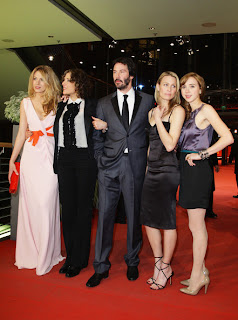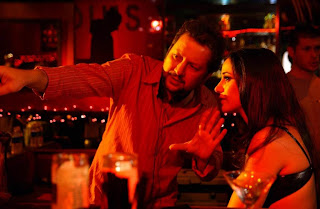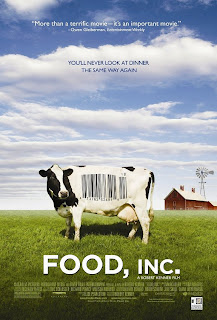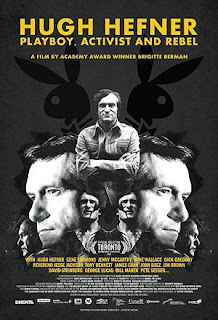 Most people have an opinion about Hugh Hefner. The pajama-clad creator of Playboy magazine and star of the “Girls next Door” TV show has been in the public spotlight since he started the magazine in the early 1950’s. And while the more salacious aspects of Mr. Hefner’s exploits are well publicized, his life and social activisms have gone fairly unexamined up until now. In the new documentary Hugh Hefner: Playboy, Activist, Rebel; Oscar winning director Brigitte Berman explores the life of publishing’s most polarizing figure. And what she finds may surprise you. Behind the glamour of beautiful women, celebrity status, and wealth; stands a thoughtful, well-spoken man of purpose and resolve. HollywoodJam got a chance to talk to Mr. Hefner about this new film, the early days of Playboy and how movies inspired him to stand up for what he believes in.
Most people have an opinion about Hugh Hefner. The pajama-clad creator of Playboy magazine and star of the “Girls next Door” TV show has been in the public spotlight since he started the magazine in the early 1950’s. And while the more salacious aspects of Mr. Hefner’s exploits are well publicized, his life and social activisms have gone fairly unexamined up until now. In the new documentary Hugh Hefner: Playboy, Activist, Rebel; Oscar winning director Brigitte Berman explores the life of publishing’s most polarizing figure. And what she finds may surprise you. Behind the glamour of beautiful women, celebrity status, and wealth; stands a thoughtful, well-spoken man of purpose and resolve. HollywoodJam got a chance to talk to Mr. Hefner about this new film, the early days of Playboy and how movies inspired him to stand up for what he believes in.HJ-One of the interesting facts that the film points out is that very early on you tried to make the magazine “erudite titillation”, that you used very talented writers; and that some of those writers had been blacklisted by the government. How intentional was that for you at the time.
HH-Well it was conscious. Absolutely. You must understand that the 1950s, Playboy began in 1953, and it was a time of very real, not just sexual repression, but also political repression. And I was opposed to both. I felt that to some extent -- I served in WWII and I thought things were going to change after the World War, and I felt that to some extent, when we became so conservative, etc. and started blacklisting people and spying on our neighbors, I felt as if we, to some extent, had become the very thing that we had defeated. So I had very strong feelings about all of that.
HJ-Did you understand how dangerous it was at that time, or what type of criticisms and accusations you would invite to you personally and the magazine?
HH-Well you have to understand that I was a kid who grew up during the Depression and was very much influenced by movies. And particularly movies by directors like Frank Capra. So that films like Mr. Smith Goes to Washington and Meet John Doe. Those films mad a big influence on me, so I was a kid who really believed in the American Dream and believed in freedom, equality and, you know, the good half of what America's all about.
HJ-The idea that “Right” will win out.
HH-Yes.
HJ-So, in the early days of the Playboy magazine, did you feel un-due pressure from government? It's talked about in the film how you had to change the laws and fight for the postage rights to get the magazine out, but were there any other pressures you felt?
HH-Well to be perfectly frank, I was on such a role, I just felt so blessed to be doing something that I really loved and it was so successful and so embraced from the very beginning that the problems I had to overcome interns of the post office and the government and harassment, etc. were just part of the price that you paid for it. And it just made it seem all the more important to me.
HJ-As the movie progresses, we see more of your life and decisions you made on behalf of the magazine. While you are not normally thought of as a crusader, certainly there are examples of social activism. Was that something that happened naturally as the magazine progressed?
HH-Yeah, I think it happened naturally. The reality is that I did become a social activist, and had a lot of fun doing it (laughs). And I think that one of the reasons that I’m not thought of in that context most the time is because there is more interest in the fact that I had so much fun doing it.
HJ-People are concentrating on the titillating aspects of your life as opposed to…
HH-Yeah, Ray Bradbury said a long time ago, and he's a long-time contributor to the magazine and we published Fahrenheit 451 in the early issues of the magazine --
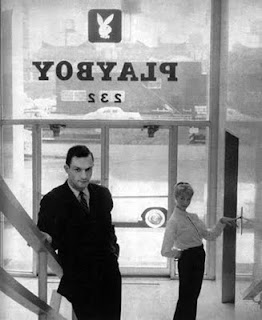 HJ-That is something that most people don't know. That it had actually been published in your magazine before the book form.
HJ-That is something that most people don't know. That it had actually been published in your magazine before the book form.HH-Yes, and his comment about Playboy was that a lot of people don't see the “forest” for the “tease”. In other words you don't see the good writing, you don't see the social activism, etc. because you're looking at the centerfolds. And I think that's understandable.
HH- Yes. That's really true.
HJ-How important was it to you as you were starting out to have that aspect of the magazine? That there would be the learned, sophisticated content, as well as the titillation?
HH-That was the whole point of it all. The whole point was to create a really good entertainment package for the adult, sophisticated male. To not include an appropriate appreciation for the opposite sex would have been ridiculous. But historically before that, sex had been the element that had been left out. So you know it was combining that with a really well put together package with the very best in interviews, the very best in fiction, the very best in non-fiction, and the most beautiful girls.
HJ-What was your first reaction when Brigitte Berman (Director) came to you and asked you to do this documentary about you? Were you at all hesitant?
HH-No because I had met her originally when she won the Academy Award for her film on Artie Shaw (Artie Shaw: Time is All You’ve Got) and that was our initial connection. And we became friends and after knowing each other for a few years, she said, you know the one I'd really like to do a documentary on is you. And I said, OK why not? With no real sense, quite frankly, of what it was going to turn out to be. And I must confess that I was blown away by the results. She walked into my life and gave it a whole different perspective. In other words she dealt with the other part of my life that most people just didn't know about.
HJ-Was there anything that you were surprised about after watching the movie? Maybe something you hadn't thought about or considered about your life?
HH-Well I think the major reaction, quite frankly, was that she put it all together and brought back a flood of memories for me. I found the film very emotionally touching. And to have it done by a woman, it was very moving, very satisfying.
HJ-The word maverick gets thrown around really loosely today, but in the 1950’s you made a TV variety show (Playboy Penthouse); you syndicated it; which means you didn't have follow anyone's rules as a result, and featured anybody you wanted. How important was it for you to show, really for the first time on TV, blacks and whites socializing in that sort of atmosphere?
HH-Well it was very satisfying. Indeed we actually talked about it on the show with some of the artists, and some of the artists were mixed racially… and the fact that they could not appear on network television. And of course what complicated it even more was the fact that it was not simply a television show. It was a television show the concept of which was that it was in my home. That it was my apartment, so it was socializing in a way that at that point unacceptable in parts of America. In other words, blacks and whites simply didn't socialize on that kind of level in those days and I felt that was wrong. It was not the point of the show, but in the process of doing a variety show, an entertainment show, I was able to do it in a way that had some real resonance to it and it really made some difference. So you look back on the show now and it takes on an iconic kind of quality that I'm very proud of.
HJ-It's something that literally does not exist anywhere else on TV at that time.
HH- That's right.
HJ-There's been an enormous amount of research done on the early days of television: the social morals of the time and what was allowed and not allowed. Your show, which broke every single rule of the day, doesn't really seem to find a place in that research. It is largely over looked, if not out right ignored.
HH- Well, that may be partly because both Playboy After Dark and Playboy's Penthouse were syndicated shows for a season or two. But they are remembered now in an iconic way. And probably more highly regarded today than they were at the time.
HJ-A last question for you is, for someone who doesn't know very much about you or who has only read the more salacious bits, after watching this movie, what do you hope that they find out about you?
HH-Well, I think it will be a revelation for a lot of people.

It certainly will be.
HUGH HEFNER: PLAYBOY, ACTIVIST AND REBEL. Oscar-winning™ producer/director Brigitte Berman takes examines the life of the flamboyant, outspoken founder of the Playboy empire and his many fierce battles with nearly all levels of the U.S. government, the religious right, and militant feminists.




